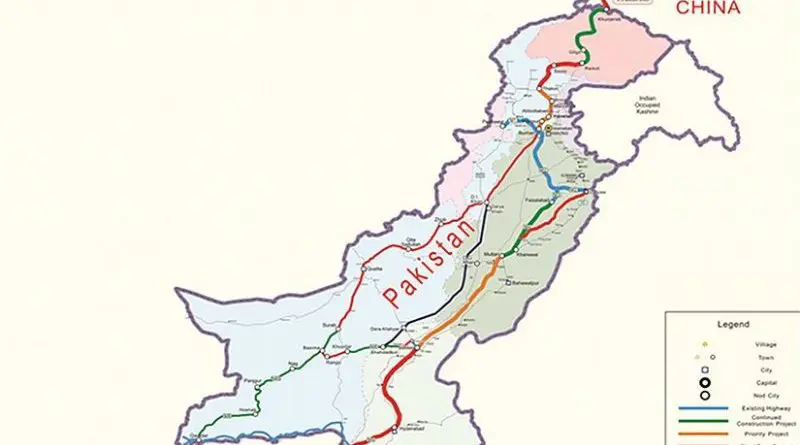Highlighting 10 Years Of CPEC Progress – OpEd
Pakistan-China ties are strengthening, and both countries continued to enhance their strategic and economic cooperation. The close relationship between Pakistan and China has been longstanding and is based on mutual trust and shared interests. Pakistan and China share a strategic partnership that encompasses various areas, including defense, security, and counterterrorism. Both countries have supported each other on regional and international issues of common concern.
The China-Pakistan Economic Corridor (CPEC) has been a cornerstone of economic cooperation between the two nations. CPEC has not only bolstered Pakistan’s infrastructure and energy sectors but has also deepened economic integration between China and Pakistan. The project has attracted significant Chinese investment and has the potential to transform Pakistan’s economy. China has consistently supported Pakistan on the international stage, including advocating for its interests in forums like the United Nations. Similarly, Pakistan has backed China on issues such as the One China policy and its stance on the South China Sea.
The China-Pakistan Economic Corridor (CPEC) is a significant project that aims to enhance economic cooperation between Pakistan and China. Launched in 2015, CPEC is part of China’s broader Belt and Road Initiative (BRI), which seeks to connect Asia with Europe and Africa through infrastructure development and economic cooperation. CPEC focuses on developing transportation networks, energy projects, industrial zones, and other infrastructure to boost economic progress in Pakistan. Here are some highlights of Pakistan-China economic progress under CPEC:
One of the primary objectives of CPEC is to upgrade and build new infrastructure in Pakistan. This includes the construction of roads, railways, ports, and airports to improve transportation and connectivity within the country and with China. The development of Gwadar Port is a key component of CPEC, which is expected to become a major regional trade hub. Pakistan has faced energy shortages for years, hindering its economic growth. CPEC has facilitated the construction of several energy projects, including coal, solar, hydroelectric, and wind power plants. These projects have helped to alleviate the energy crisis in Pakistan, ensuring a more stable power supply for industries and households.
CPEC aims to establish industrial zones and SEZs in various parts of Pakistan. These zones are designed to attract foreign investment and boost industrialization, leading to job creation, increased exports, and economic diversification. CPEC has improved trade between Pakistan and China. The enhanced transportation infrastructure has reduced the cost and time of transporting goods, making it easier for both countries to trade with each other and access regional markets.
The development of infrastructure and industrial zones has created job opportunities for the local population in Pakistan. This has contributed to reducing unemployment and poverty levels in certain regions of the country. CPEC has attracted significant foreign investment from Chinese companies and other international players. The collaboration between China and Pakistan has encouraged foreign businesses to invest in various sectors, leading to economic growth and technology transfer.
Beyond the economic aspects, CPEC has strengthened the strategic partnership between Pakistan and China. The two countries have deepened their diplomatic, cultural, and defense ties, enhancing overall cooperation. CPEC’s success has the potential to improve regional connectivity and boost economic integration among countries in the region. It can serve as a catalyst for regional development and cooperation.
Cultural and educational exchanges between the two countries have fostered people-to-people ties. Both nations have encouraged academic collaborations, cultural exchanges, and tourism, leading to a better understanding and appreciation of each other’s cultures. Pakistan and China have a long history of defense cooperation, with China being a major supplier of military equipment to Pakistan. Both countries conduct joint military exercises and training programs, further strengthening their defense ties.
Pakistan and China share concerns about regional stability, especially in South Asia. They cooperate to address common security challenges and promote stability in the region. Belt and Road Initiative (BRI): As part of China’s broader Belt and Road Initiative, Pakistan is a key partner for China’s efforts to improve regional connectivity and trade. This has led to increased collaboration and cooperation between the two nations.

